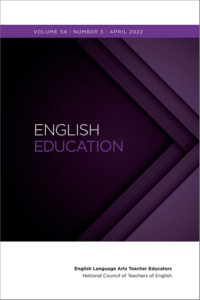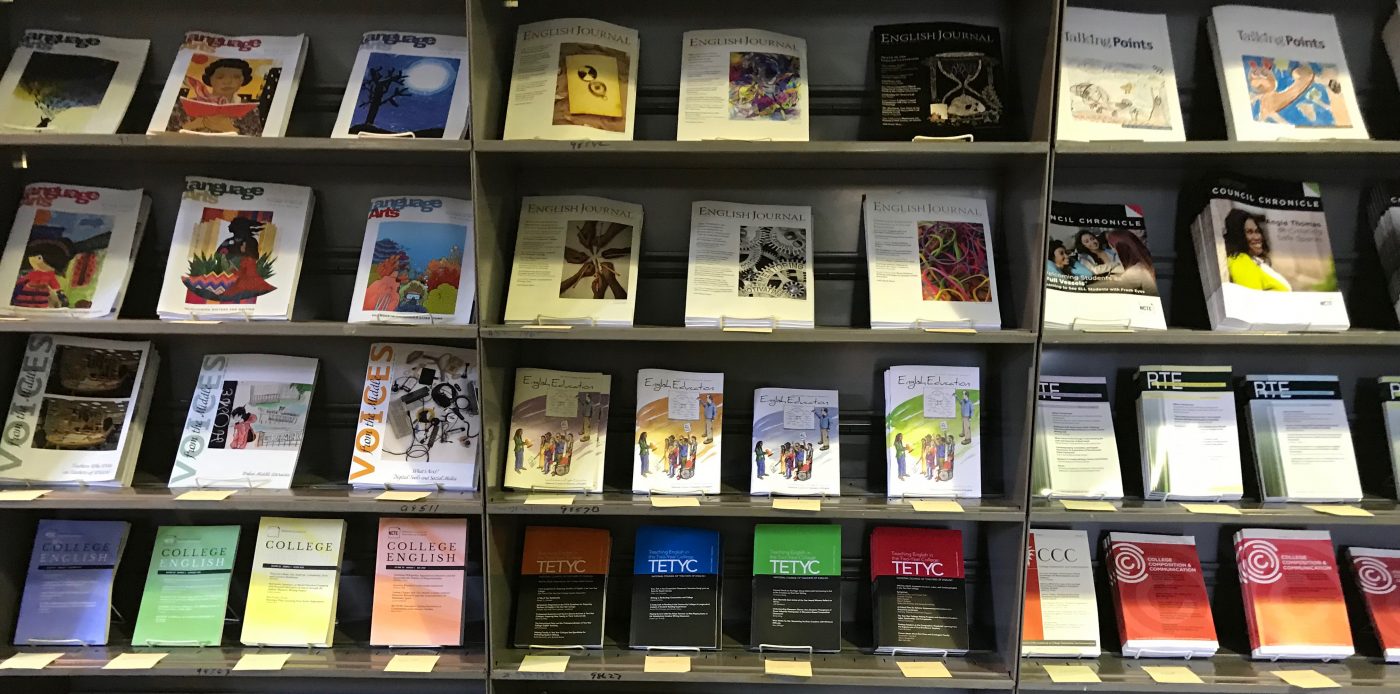The idea of discomfort and preparing preservice teachers (PSTs) is also explored by way of belonging in rural-focused ELA teacher preparation. In “Rurally Motivated? How English Teachers Negotiate Rural Sense of Belonging,” Allison Wynhoff Olsen, Danette Long, Kristofer Olsen, and William J. Fassbender describe a multiyear study that explored the complexities of introducing PSTs to rural teaching. The authors examine how PSTs negotiate space, people, and curriculum as they consider their sense of belonging in rural schools and communities across several experiences, including a rural-intensive practicum course, a student teaching semester, and—in some cases—contracted teaching jobs in rural schools.
The essential question arising from this issue is, What does it mean to belong in rural spaces? What does it mean to act rural, teach rural, sound rural, be rural? Leslie Cook picks up a thread of this work in “Valuing Linguistic Diversity: Transforming the Teaching of Grammar for Rural Preservice Secondary English Teachers.” In her exploration of praxis, she describes the nuanced work of revising and teaching a required applied grammar course to preservice English teachers in Appalachia. Reflecting on her instruction, she considers what it means to explore systemic functional linguistics and issues of politics and power as they relate to speech, dialect, and writing, particularly for People of Color and those in geographically and politically marginalized spaces. Cook describes how PSTs explore the connection between linguistic diversity and social equity using pragmatics as a central focus in analyzing linguistic choices.
Beyond preparing English teachers, Ashley Boyd and Janine Darragh describe a qualitative case study of a high school English teacher exploring Jeff Zentner’s The Serpent King with her rural students. In “Reading The Serpent King to Connect to Students’ Lives and Experiences in Rural Contexts,” Boyd and Darragh explore work that centers place in dialogue and storytelling as a way of viewing rurality as a worthy topic of study. Using a critical rural English pedagogy frame (Petrone & Wynhoff Olsen, 2021), they describe a teacher’s intentions for affirming rural students’ lived experiences, highlighting the importance of both pre- and inservice teachers interacting with rural literature and its impact on practice.
The pieces in this themed issue focus on the nuances and diversity of rural people and places as they relate to the preparation of English teachers, the culturally responsive practice of inservice teachers, and the importance for rural students to see themselves (and others) in contexts that serve to disrupt the dominant deficit narrative of rural places. Wynhoff Olsen and colleagues illustrate how, at a programmatic level, teacher education programs can work to offer their PSTs experiences in rural places that might foster a sense of belonging, whereas Spanke explores how, at the course level, students’ identification with rural identities and communities are connected to similar factors as in the Wynhoff Olsen et al., piece. We invite readers to consider how teacher educators can provide space in classrooms for the negotiation of these identities across individual identification and representation in curriculum (e.g., young adult texts) and professional identification with teaching methods in rural places. Likewise, Boyd and Darragh explore how their teacher participant felt comfortable in her rural practice because she was from a rural place. Cook further explores how language varieties shape this sense of identity and comfort, with Shelton’s work allowing space for the discomfort in bridging this work in rural spaces.
We proposed this themed issue in part due to our own journeys as rural natives, English teachers, and rural education scholars. We found it difficult to find ourselves reflected in the books we read or taught, in the pedagogies and best practices we learned about, or in the literacy scholarship advanced in journals like this one. This has been a challenge for those who identify as rural English educators and rural education scholars, with many either addressing this issue or calling for action to close this gap (see, for example, Azano, 2015; Azano et al., 2021; Eckert & Petrone, 2013; Parton, 2020; Petrone & Wynhoff Olsen, 2021). Despite these calls, very few articles about rural contexts appear in prominent literacy journals, relegating them to rural-specific journals, thus further reinforcing the notion that rural issues are not of broad interest and concern. However, as the authors in this issue argue, rural literacy challenges and opportunities matter, as do the students and teachers in rural communities. However, this work is incomplete, and we hope future work in literacy journals will explore rural contexts and Indigenous, Latinx, Black, and other intersecting identities (and we acknowledge that many of our colleagues are indeed engaging in this work). We are grateful for this opportunity to respond to the call and to the authors included in this issue for their commitment and perseverance during the most challenging of times.
References
Azano, A. P. (2015). Addressing the rural context in literacies research: A call to action. Journal of Adolescent & Adult Literacy, 59(3), 267–269.
Azano, A. P., Brenner, D., Downey, J., Eppley, K., & Schulte, A. (2021). Teaching in rural places: Thriving in classrooms, schools, and communities. Routledge.
Eckert, L. S., & Petrone, R. (2013). Raising issues of rurality in English teacher education. English Education, 46(1), 68.
Parton, C. (2020). “Country-fied city or city-fied country?”: The impact of place on rural out-migrated literacy teachers’ identities and practices (Doctoral dissertation).
Petrone, R., & Wynhoff Olsen, A. (2021). Teaching English in rural communities: Toward a critical rural English pedagogy. Rowman & Littlefield.
Chea Parton is a farm girl, former rural student and teacher, and advocate for rural English education. She currently works with future teachers at the University of North Texas. She has been a member of NCTE since 2008. You can reach her via Twitter @readingrural or via email at readingrural@gmail.com.
Amy Price Azano is an associate professor of rural education and adolescent literacy at Virginia Tech and director of the Virginia Tech Center for Rural Education. Her scholarship focuses on literacy and equity issues related to rural schools and communities. She has been a member of NCTE since 1998. You can reach her via Twitter at @ruralprof or via email at azano@vt.edu.
Pull Quotes
The articles in this issue raise important questions surrounding what it means to be rural and how teacher educators can best prepare ELA teachers to be and teach in rural schools and communities.
The essential question arising from this issue is, What does it mean to belong in rural spaces? What does it mean to act rural, teach rural, sound rural, be rural?
We found it difficult to find ourselves reflected in the books we read or taught, in the pedagogies and best practices we learned about, or in the literacy scholarship advanced in journals like this one.

 These contexts also shape perceptions about rural people and places. Our own experiences growing up in rural environments—Chea, a farm girl from Indiana, and Amy in the heart of Virginia’s Blue Ridge Mountains—taught us early on that even the way we sounded could evoke stereotypes about who we were and where we were from. These stereotypes can influence expectations about rural students and communities. Even though approximately 20 percent of the U.S. student population attends rural schools, they have persistently struggled to recruit and retain teachers, creating a dire need to focus on preparing teachers who are ready to understand and respond to the unique experiences of rural students and communities. Yet over the last two decades, there have been very few publications in prominent literacy journals that explicitly attend to the preparation of rural teachers.
These contexts also shape perceptions about rural people and places. Our own experiences growing up in rural environments—Chea, a farm girl from Indiana, and Amy in the heart of Virginia’s Blue Ridge Mountains—taught us early on that even the way we sounded could evoke stereotypes about who we were and where we were from. These stereotypes can influence expectations about rural students and communities. Even though approximately 20 percent of the U.S. student population attends rural schools, they have persistently struggled to recruit and retain teachers, creating a dire need to focus on preparing teachers who are ready to understand and respond to the unique experiences of rural students and communities. Yet over the last two decades, there have been very few publications in prominent literacy journals that explicitly attend to the preparation of rural teachers.
